Carbs and Weight Loss: Good vs Bad Carbs Explained
Published On : 29th Sep 2025
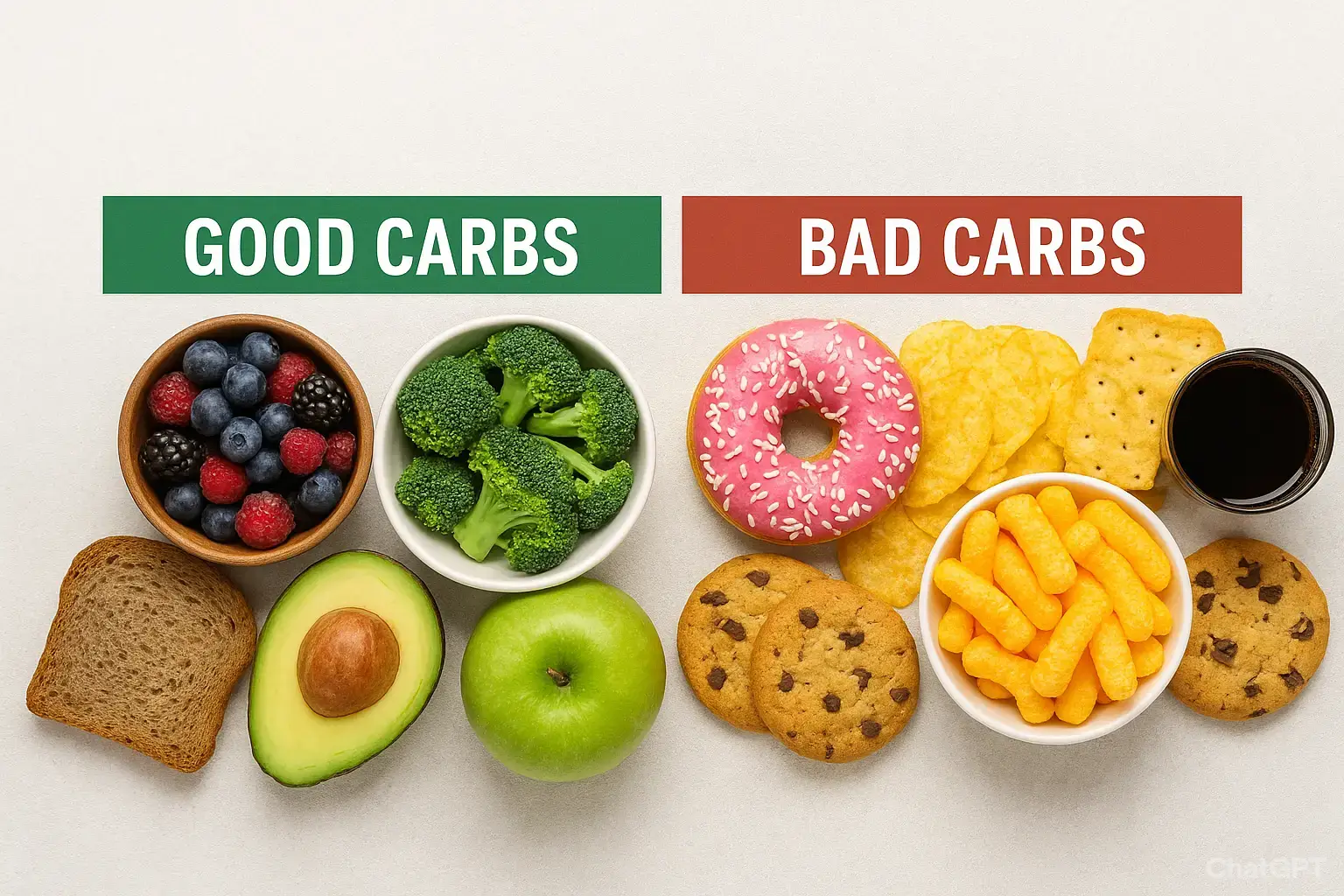
When it comes to weight loss, one of the most debated topics in the fitness world is carbohydrates (carbs). Many popular diets like keto and low-carb plans encourage cutting out carbs completely, claiming they are the enemy of weight loss.
But here’s the truth: not all carbs are bad, and completely eliminating them might do more harm than good. The key is to understand the difference between good carbs and bad carbs — and how to include the right ones in your diet for sustainable fat loss.
What Are Carbohydrates and Why Do You Need Them?
Carbohydrates are one of the three main macronutrients, alongside proteins and fats. They are the primary source of energy for your body and brain.
When you eat carbs, your body breaks them down into glucose (sugar), which is then used for fuel. If you consume more carbs than your body needs, the extra glucose gets stored as fat, leading to weight gain.
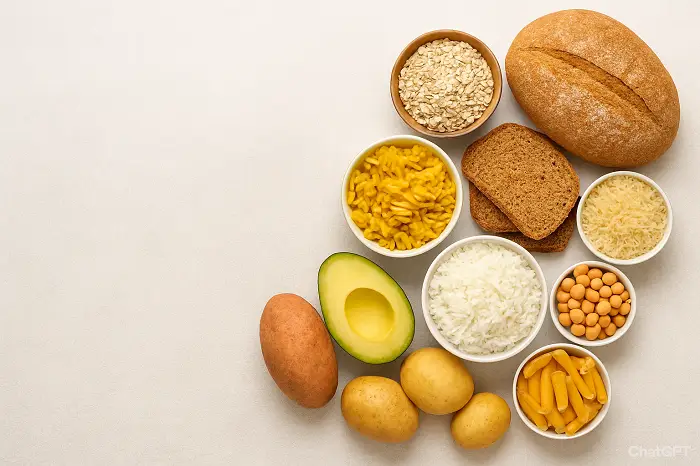
- Key Functions of Carbs:
- Provide energy for workouts and daily activities
- Support proper brain function and focus
- Help regulate digestion through dietary fiber
- Assist in muscle recovery after exercise
Fun Fact: Even if you don’t eat carbs, your body will make glucose from protein and fat in a process called gluconeogenesis — showing how essential carbs are for survival.
Good Carbs vs. Bad Carbs: The Main Difference
Not all carbs are created equal. The difference lies in how quickly they digest and how they impact blood sugar levels.
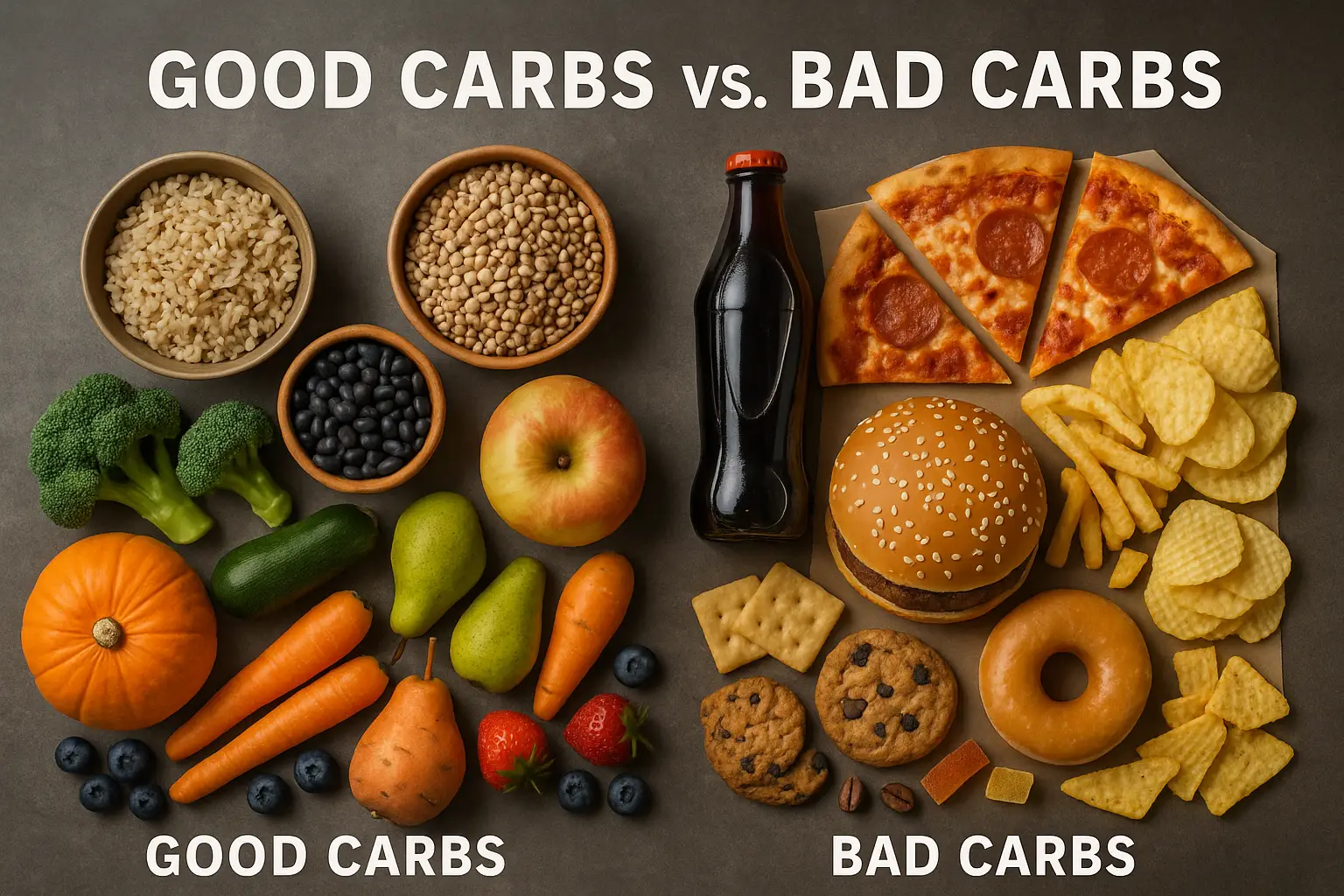
| Good Carbs |
Bad Carbs |
| Slowly digested, providing steady energy |
Quickly digested, causing blood sugar spikes |
| High in fiber and nutrients |
Low in fiber, mostly empty calories |
| Found in whole, natural foods |
Found in processed, packaged foods |
| Support weight loss and gut health |
Lead to cravings and weight gain |
- Good Carbs (Complex Carbs): Good carbs, also known as complex carbohydrates, are packed with fiber, vitamins, and minerals. They release energy slowly, keeping you full for longer and preventing hunger spikes.
Examples of Good Carbs:
- Whole grains: Brown rice, oats, quinoa, whole wheat bread
- Fruits: Berries, apples, oranges, pears
- Vegetables: Broccoli, spinach, carrots, zucchini
- Legumes: Lentils, chickpeas, black beans
- Starchy vegetables: Sweet potatoes, pumpkin
Why They’re Good for Weight Loss:
- Fiber keeps you satiated, reducing overeating
- Stabilizes blood sugar, preventing cravings
- Boosts metabolism and digestion
- Provides long-lasting energy for workouts
Pro Tip: Choose carbs with low to medium Glycemic Index (GI) to keep insulin levels stable and support fat burning.
- Bad Carbs (Simple Carbs): Bad carbs, also called simple carbohydrates, are usually processed, refined, and low in nutrients. They digest quickly, causing a sudden spike in blood sugar followed by a crash — which often leads to hunger and overeating.
Examples of Bad Carbs:
- Sugary drinks: Sodas, energy drinks, packaged juices
- Refined grains: White bread, pasta, white rice
- Desserts: Cookies, cakes, pastries, donuts
- Snacks: Chips, candies, crackers
- Fast foods: Pizza, burgers with white buns
Why They Sabotage Weight Loss:
- Cause fat storage due to insulin spikes
- Lead to sugar cravings and binge eating
- Contain empty calories with little nutrition
- Increase the risk of diabetes and obesity
Did You Know? Many “diet” foods labeled low-fat are often packed with sugar, making them just as bad as junk food for weight loss.
How Carbs Affect Weight Loss
Carbs don’t automatically cause weight gain — calories and quality matter most.
Here’s how carbs play a role in fat loss:
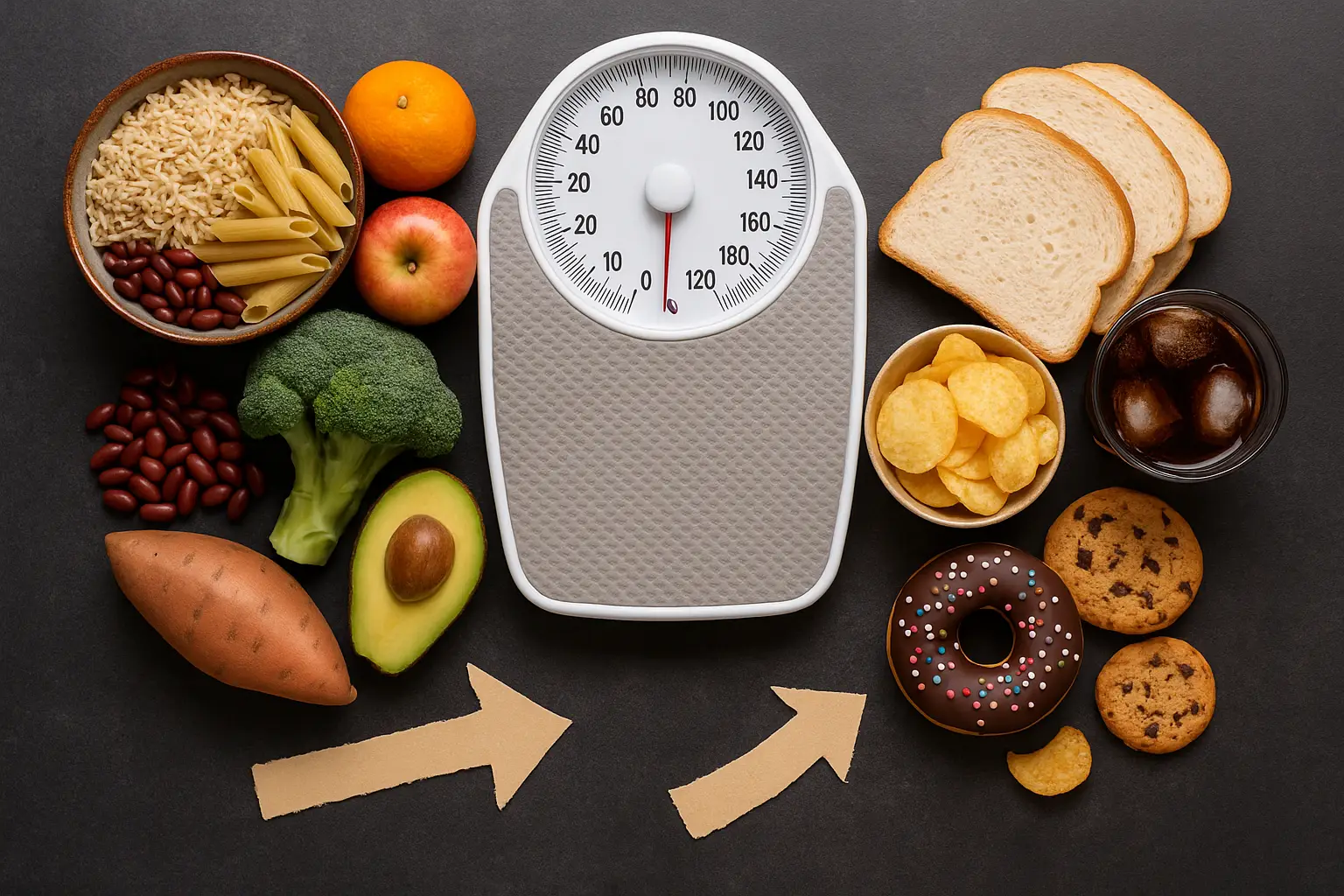
- Eating the Right Carbs Boosts Fat Burning:
- Complex carbs keep you energized for workouts, helping you burn more calories.
- High-fiber foods reduce hunger, making it easier to stay in a calorie deficit.
- Too Many Bad Carbs Cause Fat Storage:
- Refined carbs trigger insulin spikes, signaling your body to store fat, especially around the belly.
- Excess sugar gets converted into triglycerides, increasing the risk of heart disease.
- Low-Carb Diets vs Balanced Diets:
- Low-carb diets, like keto, can lead to rapid weight loss initially.
- However, completely cutting out carbs may cause fatigue, brain fog, and nutrient deficiencies.
- A balanced approach — focusing on good carbs and portion control — is more sustainable long-term.
How to Include Good Carbs in Your Diet
Here are some practical tips to enjoy carbs while losing weight:
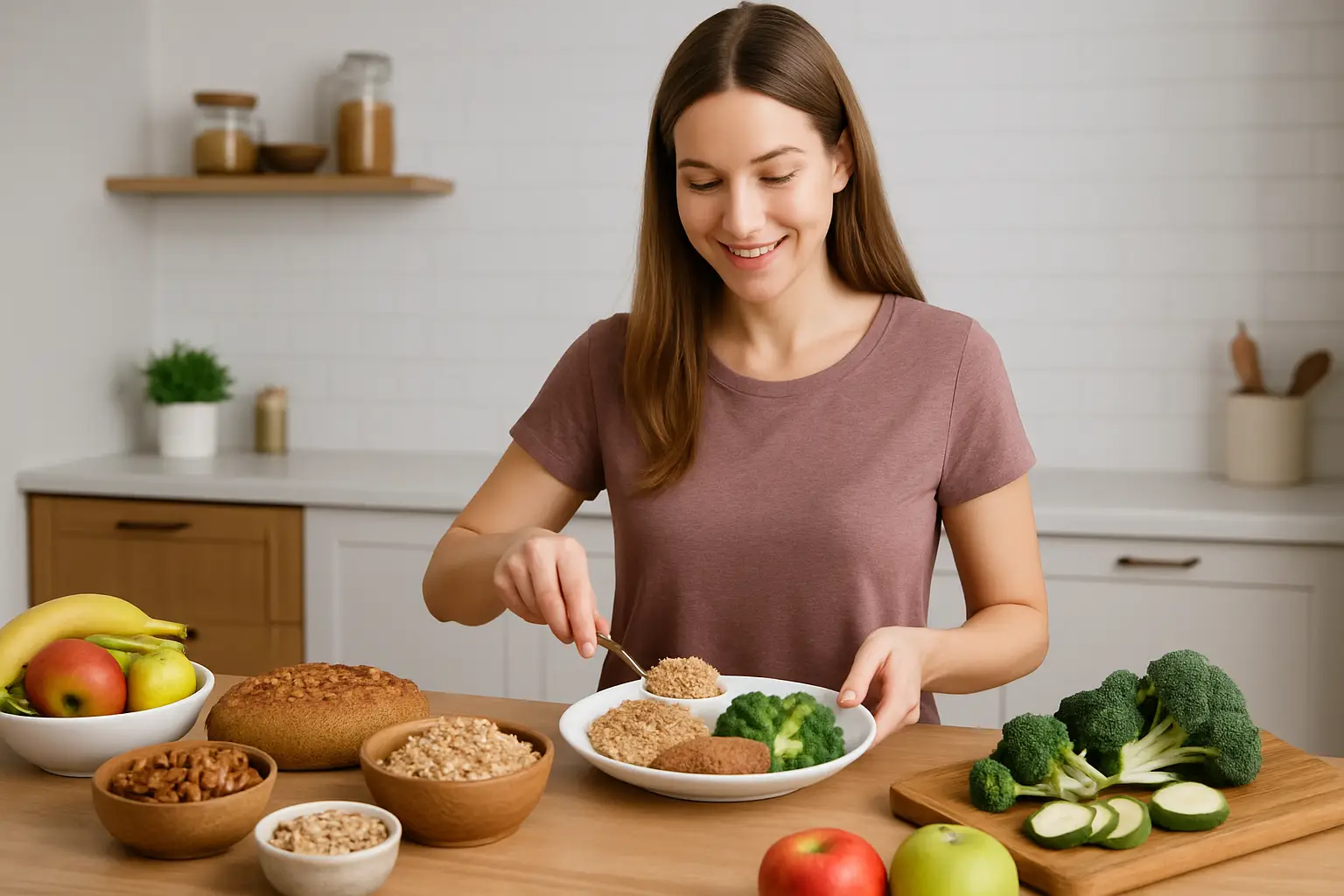
- Choose Whole Over Processed:
- Swap white rice for brown rice or quinoa
- Replace white bread with whole-grain bread
- Snack on fruits and nuts instead of chips or cookies
- Portion Control is Key: Even healthy carbs can lead to weight gain if eaten in excess.
- Use the plate method: ½ veggies, ¼ protein, ¼ carbs
- Measure grains like oats or rice to avoid overeating
- Time Your Carbs Smartly:
- Eat complex carbs before workouts for energy
- Limit carb intake at night, when activity levels are low
- Read Food Labels:
- Look for whole grains and at least 3g of fiber per serving
- Avoid foods with added sugars or artificial ingredients
Sample One-Day Carb-Friendly Weight Loss Plan
Here’s a simple meal plan to show how you can include good carbs while losing weight:
- Breakfast: Oatmeal topped with berries and chia seeds
- Snack: Apple slices with almond butter
- Lunch: Grilled chicken, quinoa, and steamed broccoli
- Snack: Greek yogurt with flaxseeds
- Dinner: Salmon with roasted sweet potatoes and spinach
Conclusion
Carbs are not the enemy when it comes to weight loss. In fact, they are essential for energy, brain function, and overall health. The real issue lies in processed, refined carbs that add empty calories to your diet.
By focusing on good carbs like whole grains, fruits, vegetables, and legumes, you can create a balanced diet that helps you burn fat, build muscle, and maintain a healthy weight in the long run.
Remember: Sustainable weight loss comes from a balanced approach, not extreme restrictions.
Frequently Asked Questions
Carbohydrates are one of the main macronutrients that provide energy to your body. They are broken down into glucose, which fuels your brain, muscles, and vital organs. Good carbs, like whole grains and vegetables, also contain fiber, vitamins, and minerals that are essential for overall health.
Good carbs are complex carbohydrates that are high in fiber and nutrients, such as whole grains, fruits, vegetables, and legumes. Bad carbs are simple or refined carbohydrates, like white bread, pastries, soda, and sugary snacks, which spike blood sugar levels and provide little to no nutritional value.
Eating carbs alone doesn’t directly cause weight gain. Weight gain happens when you consume more calories than you burn. However, bad carbs can increase cravings, leading to overeating and fat storage, especially around the belly area. Choosing the right carbs in moderation helps manage weight effectively.
Low-carb diets, like keto or Atkins, can help with short-term weight loss by reducing insulin spikes and water retention. But completely cutting out carbs is not sustainable or healthy for most people. Instead, focus on replacing refined carbs with whole, nutrient-rich carbs for long-term results.
Bad carbs are digested quickly and cause a rapid spike in blood sugar, triggering a surge in insulin. Good carbs are digested slowly, providing steady energy and preventing sharp blood sugar spikes, which is especially important for people with diabetes or insulin resistance.
- Oats and quinoa
- Brown rice and whole-grain bread
- Sweet potatoes and yams
- Fresh fruits like berries and apples
- Vegetables like broccoli, spinach, and carrots
- Legumes like lentils and chickpeas
- Sugary drinks like soda and energy drinks
- White bread and white rice
- Processed snacks like chips and cookies
- Candy and desserts high in sugar
- Packaged breakfast cereals with added sugar
The ideal carbohydrate intake depends on your age, activity level, and health goals. For most people aiming for weight loss, 45–55% of daily calories should come from carbs, focusing on whole and unprocessed sources. Consult a nutritionist for a personalized plan.
Most fruits are good carbs because they are rich in fiber and natural sugars. However, fruits like mangoes, grapes, and bananas are higher in sugar, so portion control is key, especially for diabetics or those trying to lose weight.
Yes, you can lose weight while eating bread or pasta, but choose whole-grain options and control portions. Combine them with lean proteins and healthy fats to slow digestion and keep you full longer.




